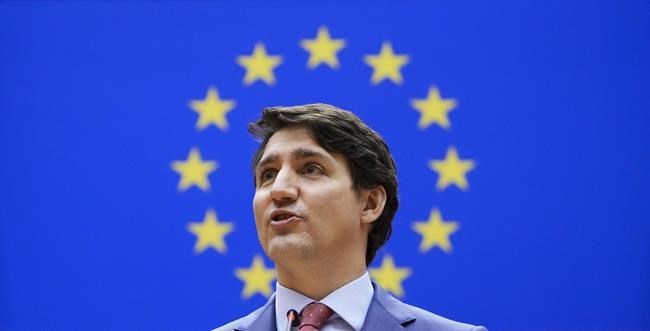BRUSSELS — Prime Minister Justin Trudeau made a plea to European leaders to come together as democracies in the face of Russia's unprovoked invasion of Ukraine and tackle growing uncertainties citizens have about the future.
The one-month-old conflict has not only caused security unrest in Europe and around the globe, it has also sent another shock to a global economy climbing its way out of the COVID-19 pandemic.
Rising global inflation rates, which in Canada have hit three-decade highs, have further inflamed what Trudeau said were long-simmering economic frustrations that now drive deep uncertainties about the future, as well as distrust of government.
Speaking to European parliamentarians, Trudeau called on them as democracies to address those concerns head on, and do the same with the threat to democracy posed by Russian President Vladimir Putin.
“Putin’s attack on Ukraine is an attack on the values that form the pillars of all democracies. We have a responsibility to make the case to people about why these values matter so much — not just to Ukrainians, but to us all,” Trudeau said in his remarks.
It was his second time addressing the European Parliament, following a 2017 speech that was meant as a shot in the arm for a continent reeling from Britain's vote a year earlier to leave the European Union amid the election of Donald Trump in the United States.
Trudeau referenced that five-year-old speech on Wednesday, noting at the time everyone in the room could see something lurking on the horizon that threatened the international order.
He looked no further than the protesters who clogged the streets around Parliament Hill last month, saying that organizers of the so-called Freedom Convoy used people's anxieties to turn citizens against a democratic system that was best suited to allay their concerns.
He argued that governments can and should play a positive role in people’s lives.
Economically, the Russian invasion of Ukraine — which Trudeau said amounted to war crimes with the targeting and killing of civilians in hospitals and residential buildings — has led to a jump in global oil prices and the price of gas.
It's also sent global food prices higher because Ukraine is a key exporter of wheat that, importantly, helps the United Nation's World Food Programme.
In response, Europe and Canada agreed to provide direct food aid and ramp up the supply of agricultural products generally, said European Commission President Ursula von der Leyen.
Europe is also now looking to Canada for oil and gas as part of a plan to help the continent end its dependency on Russian fossil fuels.
“Canada is determined to continue to lead the way on moving towards net zero, decarbonizing as much as possible," Trudeau said during remarks ahead of a working dinner with von der Leyen.
"At the same time, as we recognize the need for people to replace Russian oil and gas in the short term, we will, of course, look at ways that Canada can help."
The two also announced a G7 group aimed at ensuring that targeted Russians and organizations won't be able to evade the economic sanctions levelled against them.
Other options for ending the fighting will be on the agenda Thursday when Trudeau joins other NATO leaders to co-ordinate the military alliance's response to Russia's attack on Ukraine.
Trudeau told European leaders on Wednesday that western countries must send military equipment and lethal aid to Ukraine, and further tighten economic sanctions on Putin and his enablers in Russia and Belarus.
"We must ensure that the decision to invade a sovereign, independent country is understood to be a strategic failure that carries with it ruinous costs for Putin and Russia," he said to applause.
Trudeau toured Europe two weeks ago, holding meetings in London, Berlin, Warsaw and Riga, where he also visited Canadian troops leading a NATO multinational battlegroup.
At home he will face pressure to boost Canada's defence budget, which according to NATO estimates stands at 1.39 per cent of the country's gross domestic product in 2021.
"Ukraine is helping to make spending on defence more palatable for Canadians," said Andrea Charron, director of the Centre for Defence and Security Studies at the University of Manitoba.
"I think we need ground-based, anti-aircraft defence capabilities desperately and a replacement for the (CF-18 fighter jets)."
Before leaving Ottawa on Tuesday, Trudeau spoke with Ukrainian President Volodymyr Zelenskyy about "further international assistance ahead of the upcoming NATO and G7 meetings," the Prime Minister's Office said in a statement.
In a tweet, Zelenskyy said he specifically spoke about the "humanitarian catastrophe" unfolding in the besieged city of Mariupol, and "the importance of effective security guarantees" for Ukraine.
This report by The Canadian Press was first published March 23, 2022.
— With files from Mike Blanchfield in Ottawa
Jordan Press, The Canadian Press



